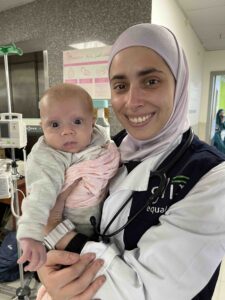A Deeper Look
This platform is intended for those who wish to deepen their understanding of the war in Gaza beyond the report at the core of this website. While the report focuses on recounting facts, the articles provide supplementary analysis of various aspects of the war —historical, sociological, legal, and more—alongside personal reflections. Our aim is to offer critical perspectives on the prevailing public discourse surrounding the Israeli war on Gaza, the West Bank, and Palestinian existence —perspectives that are often absent from mainstream media. The blog has an academic editorial board who reviews and edits the article. You may contact us and propose articles, here: adeeperlook@proton.me.
-
On Humanity and Disability in the Gaza Genocide
Dr. Anat Greenstein is an academic coordinator at the Center for Disability Studies at the Hebrew University, a feminist activist, and a woman with a disability.December 6, 2025The article highlights the overlooked experiences of people with disabilities in Gaza, whose lives are marginalized both by the dehumanization of Gazans in mainstream media and by the general invisibility of disability in public discourse. It argues that disability is not an exceptional condition but part of a broader human reality marked by vulnerability and interdependence. Even before October 7, 2023, Israeli policies, military violence, the blockade, and restrictions on medical equipment and care, actively produced disability and weakened systems of support. Despite this, disabled people in Gaza built strong networks of mutual aid and advocacy. Since 2023, conditions have dramatically worsened: people with disabilities struggle to escape bombings, lose essential assistive devices, face inaccessible shelters, and suffer heightened risks of illness, separation from family, and violence. Hunger and the collapse of healthcare place them in extreme danger, especially children. The article concludes that the dehumanization of disabled people now overlaps with the dehumanization of Palestinians, framing their deaths as “natural” or inevitable.
-
Israel is working to collapse the Palestinian Authority, and crush life chances in the West Bank
Aviv Tatarsky, translated by M.A.November 5, 2025In the past two years, and in the shadow of the war on Gaza, Israel has been endeavoring to collapse the Palestinian Authority’s economy, and with it, economic life in the West Bank. The means are multiple and varied: for two years now, workers from the West Bank have been barred from work in Israel, a step that has cut off the livelihood of about one-fifth of the West Bank’s population. In addition, under various pretexts, Israel has deducted roughly 4 billion shekels over the past two years from tax revenues due to the Palestinian Authority, thus continuously harming the livelihoods of public sector employees. The house demolitions in refugee camps, the uprooting of orchards, and the prevention of olive harvesting have been detrimental to the West Bank economy. Israeli society is indifferent to what is being done in the West Bank, but these processes, together with what is happening in Gaza, amount to a campaign to bring on the complete collapse of Palestinian society.
-
Hunger in Gaza, Based on Israeli Data
By: Dan Glück, Translation: Itamar HaritanOctober 23, 2025Dan Glück’s article demonstrates that, based on Israeli data alone, it is possible to establish that Israel starved the Gaza Strip and that it did so intentionally. Earlier Israeli attempts to completely block the entry of food into the Strip were stopped by international pressure. He likewise shows that there is no evidence of Hamas' responsibility for starvation. When comparing IDF reports to those of professional international organizations, he finds the latter to be more reliable, that the Israeli security forces often distort or conceal information, and that the Israeli press is complicit with this silencing.
-
To solve man-made hunger, we need to stop starving people
Alma IgraOctober 16, 2025To try and learn something about Israel's starvation policy in Gaza and the possibility of solving the man-made famine there, Alma Igra returns to a case considered exceptional in the history of starvation in the last century, the 1944-1945 Hunger Winter in the Netherlands. For over six months, 2.6 million Dutch people starved. Twenty thousand of them died of starvation during the period. The famine in the Netherlands, a wealthy country, was the product of a double blockade. On the one hand, a German blockade designed to break resistance to the Nazi occupation of the western Netherlands, and on the other, the policy of the Allies, Britain and the United States, to deny Nazi forces access to fuel and other goods that could have aided the Germans in the war effort. Both Nazi Germany and the Allies, in accordance with the racial and cultural hierarchies through which they understood the world, considered the Netherlands to be a country of white, civilized people; one whose inhabitants deserved more sympathy than the victims of similar cases of deliberate starvation in Eastern Europe, for example, not to mention distant colonies. Despite this, Britain and the United States preferred the military interest of continuing the blockade on Nazi forces to the possibility of effectively supplying food and goods to the starving Dutch. Determined not to break the blockade of goods on the Germans, the British and the United States delivered what aid they did provide to the starving Dutch by airdropping food shipments. The airdropping of food, familiar to us from the last two years also from the devastated Gaza Strip, created iconic images that were engraved in the Dutch national consciousness. But, just as in today's Gaza, it did not solve the problem of hunger, because a policy of starvation does not amount to simply denying food, but to destroying everything that allows raw materials to be turned into food for those who need it. For this to happen, for food to become accessible and available to those who need it most – children, the elderly, the sick, pregnant and breastfeeding women – it requires broad networks of human relationships, of transportation, technologies, and proper environmental conditions. Deliberate starvation destroys these networks. Food alone, certainly not in quantities that can be dropped from the sky, cannot solve hunger in such a situation. In the Netherlands, as in Gaza, once starvation became one of the weapons of war and the world did nothing but wave a lax finger, the starvers did not give it up willingly. To stop famine that is the product of the deliberate starvation of an entire population, we need to stop the war that starvation serves.
-
Israeli Liberalism, Denial and Genocide
Avi-ram TzoreffSeptember 30, 2025In this article, Avi-Ram Tzoreff analyzes the key role the Jewish liberal camp in Israel played in perpetuating the genocide in Gaza, in its denial and in its moral justification. According to Tzoreff, members of this camp insist on seeing themselves as moderate and fair compared to so-called "messianic" elements, but in practice they have never criticized the policies of the right-wing government towards Palestinians, and in particular its actions in Gaza. The article describes the rise of Israeli liberalism since the 1980s and shows that even during the period when it dared to challenge the use of military force against the Palestinians, this was an expression of a new self-perception of the secular middle class as a sensitive and compassionate subject, and not a political demand for a change in the power structure and/or recognition of Palestinian national rights. After the Second Intifada, the liberal discourse blamed the Palestinians for the failure of the Oslo Accords, thus justifying the continuation of Israeli control over Palestinians and the use of military force. At the same time, liberals focused on individual rights, particularly those of Jews, and especially on what they saw as the right of women and LGBT people to equal military service. This trend deepened during the protests against the legal reform, protests which blatantly ignored the occupation and the siege of Gaza in favor of engaging in intra-Jewish politics. It is this narcissistic position that enables the liberal denial of genocide over the past two years. Tzoreff concludes that the path to establishing a future of life in the land requires full recognition of the national rights of the Palestinians and an equal distribution of resources and power towards a binational coexistence.
-
Compassion as a political act of resistance
Llewelyn BarnesSeptember 4, 2025Usually, I can’t bring myself to cry when I translate testimonies of doctors who worked in Gaza. My partner encourages me to cry, she says that crying brings relief. I know it's true, but still can’t cry. I translate testimonies, and they join into a horrific, coherent story. Each of us has personal knowledge of shared humanity, through which we can understand and be empathetic towards the humanity of others. Translation of testimonies of doctors who were in Gaza is a type of activism I can do, as a disabled person and with the skills I have. Translations allow me to participate in a small and personal way in the chain of personal responsibility and caring. I have the privilege of listening with heart and passing on the words of those who do this important work.
-
On Gaza, Dogs, and Humans
By: On Barak and Irus Braverman; Translated by: Orit SchwartzAugust 24, 2025On Barak and Irus Braverman focus on Gaza’s dogs, and argue that domicide (the destruction of housing and living environments) eliminated the home as the site of what makes us human. The transformation of dogs from friendly household companions to feral animals—reveals what happens when the home is obliterated and the intimate relationships it once contained, including human-animal relationships, are drastically disrupted or eliminated. The transformation of dogs from household to homeless animals has effectively reorganized their relationships with the humans of Gaza, which now center around anxieties over bodily integrity, competition for food, and profound loss: dogs have been documented feeding on human remains, prompting Palestinian children to plead with their companion species not to devour their bodies if they die. Beyond massive destruction of infrastructure, Israel’s domicide in Gaza is an assault on the very foundations of what it means to be a Palestinian human.
-

Alone and at Risk: The Unseen Crisis of Unaccompanied Children in Gaza
By: Dr. Shulamit PinchoverAugust 12, 2025Many children in Gaza are alone. Often orphaned, forcibly separated, or left behind, they are living without the care of any adult legally or customarily responsible for them. In overcrowded shelters, hospitals, or makeshift camps, they face an acute risk of abuse, neglect, sexual exploitation, child labor, trafficking, and prolonged psychological trauma.
-

Genocide in Gaza?
By: Shmuel Lederman. Translated by: Orit SchwartzAugust 5, 2025Over the last year, a broad consensus has emerged among scholars that Israel’s actions in Gaza constitute genocide. However, when discussing the definition of genocide, a distinction must be made between two different types of discourse: legal and scholarly. Since the authoritative definition of genocide in international discourse is the legal definition, much of the discussion focuses on the extent to which Israel's actions meet the legal definition of genocide in the 1948 UN Convention on the Prevention and Punishment of the Crime of Genocide.